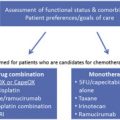
The staging and surgical management from both an Eastern and a Western perspective are discussed by Drs Sasako and Strong. An emphasis on adequate surgical staging, including laparoscopy, and the underscoring of the need for consistent and high surgical quality with adoption globally of D2 gastrectomy are made by both authors. The advent of minimally invasive surgery as an acceptable surgical alternative is also reviewed. Drs Sasako, Ilson, and Ku discuss improvement in survival with the use of adjuvant therapy. In Asia, the use of adjuvant chemotherapy after D2 gastrectomy has been proven to be beneficial, with ongoing trials of preoperative therapy in high-risk patients. In the West, perioperative chemotherapy added to surgery has been validated and adopted as standard practice. The need for the addition of adjuvant radiation therapy appears to be dictated by the adequacy of surgical resection performed, with postoperative radiation therapy appearing to benefit patients undergoing less than D1 surgical resection. For cancers of the distal esophageal and GE junction, the combination of preoperative chemotherapy and radiation therapy appears required to achieve negative margin resection and reduce the risk of local tumor recurrence. Drs Chun, Skinner, and Minsky review the role of radiation therapy–based management in cancers of the esophagus and GE junction.
Drs Janjigian, Catenacci, and Ku review emerging data for targeted agents and immunotherapy, including therapies targeting HER2 and novel pathways such as the MET and FGF receptors. Drs Wang and Sharma review the role of screening and endoscopic management of precancerous and early esophagogastric cancers. Dr Schattner reviews the importance and contribution of nutritional support as part of multidisciplinary management. Last, given that esophagogastric cancer is largely a disease of the elderly, Dr Won provides perspective on the incorporation of geriatric assessment and age-appropriate variations into treatment paradigms of these diseases.
It is clear from the reviews contained in this issue of Surgical Oncology Clinics of North America that the use of a multispecialty team to manage cancers of the esophagus, GE junction, and stomach is required to ensure delivery of state-of-the-art medical care.
Stay updated, free articles. Join our Telegram channel

Full access? Get Clinical Tree




